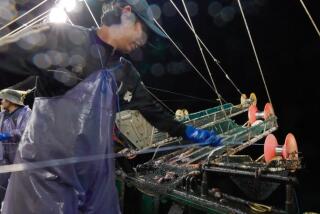THE PACIFIC : Seafood Company Rides the New Wave of Capitalism
- Share via
HO CHI MINH CITY, Vietnam — For a state-run frozen seafood company in one of the few remaining communist countries, Vietnam’s Seaprodex looks remarkably like a diversified capitalist corporation.
Its core business is exporting frozen shrimp, prawns and squid worth $100 million to $150 million a year to about 100 clients in 30 countries--chiefly Japan, Singapore, Hong Kong and nations in Western Europe.
Its network of processing plants up and down the 2,000-mile coastline account for about 40% of Vietnam’s more than $300 million in annual seafood exports.
But it also has a subsidiary finance company, which buys and sells gold and silver, deals in foreign currency, trades gems, lends money, sells bonds and handles remittances sent by overseas Vietnamese.
Seaprodex and the Seaprodex finance joint stock company, SEAFIC, founded in September, 1992, indicate how Vietnamese enterprises are adapting to market economics.
While the Seaprodex mother company is wholly owned by the Ministry of Fisheries, SEAFIC has numerous other state company shareholders in addition to Seaprodex.
As one of Vietnam’s joint stock companies, its shares may eventually be traded--when the country has a stock exchange, planned for the end of 1994 in Ho Chi Minh City.
“Our company is one of the first companies in fisheries in Vietnam,” said Kieu Van Quo, vice director general of Seaprodex and general director of SEAFIC. “We plan to reorganize ourselves into a group with diversified activities.”
SEAFIC’s main purpose is to mobilize capital for the fishing industry, Quo said. It also has plans to develop other spinoffs, including leasing fisheries equipment.
The finance firm has a turnover of $5 million to $6 million dollars a year, and Quo hopes this will rise to $10 million this year and $30 million to $40 million in 1994.
Quo says that SEAFIC, like its mother company, turns a profit, which he estimates as between 1% and 3% of turnover--or $50,000 to $180,000 a year. He declined to be more precise.
“We have not had any losses since we started,” he said, adding that the ventures’ aim has been self-sufficiency, rather than profit for profit’s sake.
Seaprodex, founded in 1978, started diversifying in 1985, a year before the ruling Communist Party’s resolution calling for the market-oriented reforms and liberalization that have transformed Vietnam’s economy.
Because the company had export experience, it handled exports of timber, farm products and machinery for other state firms as well as its frozen seafood and refrigeration plants.
It once imported farm machinery, seeds and fertilizer as well as equipment for the fishing industry, though this business, once running to $50 million a year, is declining as the agricultural sector develops its own trading networks.
As SEAFIC diversifies, its link with the seafood industry will remain vital, Quo says.
A current project is to set up a workshop to make gold jewelry with the Seaprodex brand name, which would be sold to fishermen or exchanged for seafood. The proceeds would go to buy gold.
Converting the finance company into a bank for the fishing industry is also under study.
As for the frozen seafood business, Quo says Vietnam’s export prospects are good--provided more investment is made to modernize techniques, improve production methods and buy deep-sea vessels, which the country lacks.
More to Read
Inside the business of entertainment
The Wide Shot brings you news, analysis and insights on everything from streaming wars to production — and what it all means for the future.
You may occasionally receive promotional content from the Los Angeles Times.










